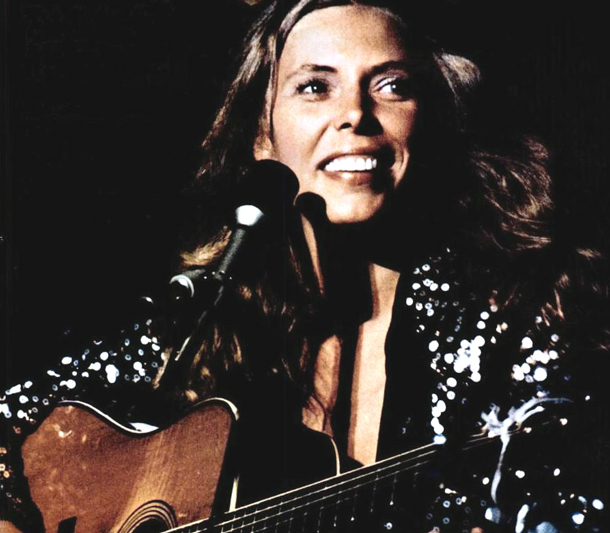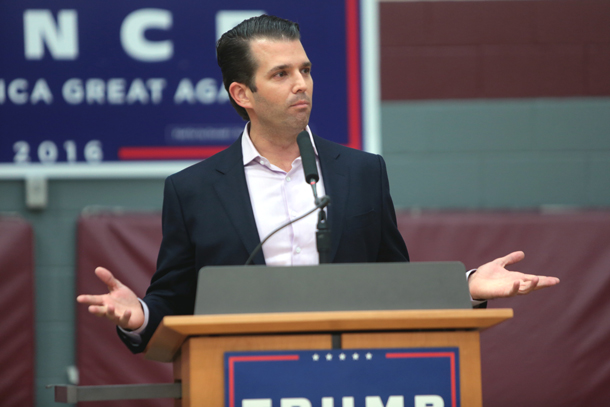Beyond the Headlines
Air Date: Week of March 22, 2019

Joni Mitchell’s “Big Yellow Taxi” is renowned for its environmental themes, including references to DDT, which was banned in the United States two years after the song’s release. (Photo: Asylum Records, Billboard, Wikimedia Commons, Public Domain)
In this week's trip beyond the headlines, Peter Dykstra talks with Host Steve Curwood about Donald Trump Jr.'s disbelief at the concept of environmental racism. Then, the two discuss the national security implications of the "bomb genesis storm" that hit the Midwest last week, as well as the recent United Nations Environment Assembly in Nairobi, Kenya. Lastly, they take a listen to an iconic song that helped shape the environmental movement of the 1970s: Joni Mitchell's “Big Yellow Taxi”.
Transcript
CURWOOD: Well, let's take a look beyond the headlines now with Peter Dykstra. Peter's an editor at Environmental Health News, that's EHN.org and DailyClimate.org. He's on the line now from Atlanta. Hey there, Peter, what's going on?
DYKSTRA: Hi, Steve. Once again, the outrageous tweet of the week goes to Donald Trump, except in this case, it's Donald Trump Jr. He said, and I quote, "Just when you thought you've seen it all, now we have RACIST AIR" - racist air in caps, of course - "this insanity has to stop." So what that tweet is about is referring to the story you just had on environmental racism. The Donald Jr. doesn't really want to acknowledge the widely accepted fact that poor and minority communities get stuck with more air pollution, water pollution, land pollution, than they have responsibility for producing. Environmental racism is a real thing everywhere except apparently in Trump world.

Donald Trump Jr. tweeted out a statement in which he claimed the concept that air pollution could disproportionately affect minority groups was “insanity”. (Photo: Gage Skidmore, Flickr, CC BY-SA 2.0)
CURWOOD: Well, then maybe that's where the insanity needs to stop. What else do you have for us?
DYKSTRA: A little bit on the national security implications of climate change. The so-called bomb tornado that hit the Midwest last week -- we've already talked about it on the show -- partially disabled Offutt Air Force Base near Omaha. That's the base that's the headquarters of the Strategic Command, the part of the military that takes the lead, the tip of the sword, as it were, in any nuclear conflict, either preventing or maybe starting a nuclear war.
CURWOOD: We talked about the flooding earlier in the program, but what happened at the Air Force Base in terms of damage?
DYKSTRA: At one point the flooding covered a full one-third of Offutt Air Force Base. It crippled its main runway and submerged many of the key buildings there.
CURWOOD: And how much is all this going to cost?
DYKSTRA: We don't have a price tag in on it yet. But we do know of a similar climate-linked problem at a military base, again pointing out global security concerns about climate change. There's another facility in Florida called Tyndall Air Force Base in the Florida panhandle. Tyndall was almost completely destroyed by Hurricane Michael. An estimated $5 to $6 billion in destroyed aircraft and destroyed buildings.
CURWOOD: What else do you have for us?
DYKSTRA: The nations of the world met last week in Nairobi, but they met in the wake of a tragedy. About 20 of the people on that Ethiopia Air flight were flying to Nairobi to participate in a UN conference on the environment, on plastics pollution. There were ambitious plans to increase the global effort on plastics. Those plans were derailed by the United States.
CURWOOD: And what did the US say?
DYKSTRA: The US made sure that any reductions in plastics were voluntary rather than mandatory and they just threw obstacle after obstacle in front of the passage of this global measure that would have, at its absolute minimum, acknowledged that we have a global problem with plastics in the ocean.
CURWOOD: Well, we have a tremendous amount of natural gas here in the United States, which of course is used to make plastic. So let's look back to the history vault, and what do you see inside today?
DYKSTRA: March 31st, 1970, a song was released that had one of the most iconic lines about the environment ever. It read, or sang, "Don't it always seem to go that you don't know what you've got 'til it's gone. They paved paradise and put up a parking lot." That, of course, is from Joni Mitchell's 'Big Yellow Taxi.'
CURWOOD: So that was a classic environmental song, 1970, you get Earth Day, you get, what, the Clean Air Act, the Clean Water Act.
DYKSTRA: Right, it was in the middle of an environmental political renaissance, when those laws were passed, the EPA was founded and many environmental groups either started or greatly increased their membership and their influence.
CURWOOD: Thank you, Peter. Peter's an editor with Environmental Health News, that's EHN.org and DailyClimate.org. We'll talk to you again real soon.
DYKSTRA: Thanks a lot, Steve, talk to you soon.
CURWOOD: There's more on these stories at our website, LOE.org. And for your listening pleasure, here's a little Joni.
Links
Huffington Post | “Donald Trump Jr. Gets Roasted Over Ridiculous Hot Take on ‘Racist Air’”
Omaha World-Herald | “One-Third of Offutt Underwater; at Least 30 Buildings Damaged in Flood”
The Guardian | “US Accused of Blocking Ambitious Global Action Against Plastic Pollution”
Living on Earth wants to hear from you!
Living on Earth
62 Calef Highway, Suite 212
Lee, NH 03861
Telephone: 617-287-4121
E-mail: comments@loe.org
Newsletter [Click here]
Donate to Living on Earth!
Living on Earth is an independent media program and relies entirely on contributions from listeners and institutions supporting public service. Please donate now to preserve an independent environmental voice.
NewsletterLiving on Earth offers a weekly delivery of the show's rundown to your mailbox. Sign up for our newsletter today!
 Sailors For The Sea: Be the change you want to sea.
Sailors For The Sea: Be the change you want to sea.
 The Grantham Foundation for the Protection of the Environment: Committed to protecting and improving the health of the global environment.
The Grantham Foundation for the Protection of the Environment: Committed to protecting and improving the health of the global environment.
 Contribute to Living on Earth and receive, as our gift to you, an archival print of one of Mark Seth Lender's extraordinary wildlife photographs. Follow the link to see Mark's current collection of photographs.
Contribute to Living on Earth and receive, as our gift to you, an archival print of one of Mark Seth Lender's extraordinary wildlife photographs. Follow the link to see Mark's current collection of photographs.
 Buy a signed copy of Mark Seth Lender's book Smeagull the Seagull & support Living on Earth
Buy a signed copy of Mark Seth Lender's book Smeagull the Seagull & support Living on Earth

